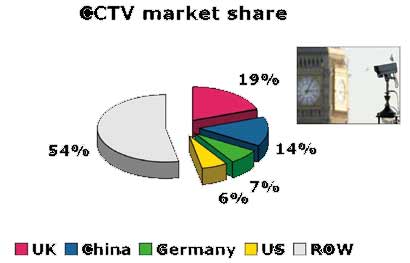Large Ev ents Drive Market Demand
The U.K. will play host to a number large events, presenting excellent opportunities for safety and security. London will welcome countless visitors for the 2012 Olympic Games, with other sites also requiring added security. A good amount of the security budget is going toward camera technology, which will easily be worth billions of pounds.
Other sporting events include the 2014 Commonwealth Games, which is the second largest event after the Olympics. In 2015, the Rugby World Cup will take place in the U.K. As the country's sporting venues will be crowded, the U.K. has good opportunities for security players.
Passing UK Certification
The Home Office Scientific Development Board is responsible for advising all police agencies. All installers will need to be certified by their local constabulary or police agency to get an approval.
The Home Office issues guidelines on how and what to install. The guidelines indicate what has to be done for legal reasons, such as data protection.
Operators of alarm centers must meet British standards, similar to standards from the American National Standards Institute. These mandates require operators to carry out certain functions or react at certain times in the event of an alarm.
Developing Effective Channel Partnerships
For manufacturers eager to enter the UK market, channel partners and distributors should be selected with care. The first thing is to make sure the product is complementary to the distributor's capabilities. Many times, channel partners will take a product and not distribute it. The only time they distribute is if customers ask for it, like a travel agent.
Manufacturers need to understand if there is an opportunity for their products. If the product contains “secret sauce” or requires significant training, such as video analytics, a manufacturer might want to consider the cost involved. Some providers may decide to do the training themselves or with a partner. They may also opt for a good system integrator to work with, instead of a distributor.
Along with finding reliable system integrators and distributors, a manufacturer can choose to also have a local representative on the ground. This can be set up quickly, as the U.K. does not require legal residence, company ownership or a British passport. At least 80 percent of the ICT companies in the U.K. are foreignowned. Having a virtual office will give a manufacturer a local presence. That can be a comfort to potential clients to know about a provider's commitment in the U.K. and their support for their product or system.
On the other hand, manufacturers may want to make that commitment more substantial with a full-blown subsidiary. Setting up a company in the U.K. is a fairly straightforward process. Companies can decide where is the best place for them to be, based on their target audience and where potential hires are. While most international companies look at London or Cambridge, other opportunities are scattered throughout the British isles.
Hiring a local manager is not cheap in the U.K. or in Europe, which has 35-hour work weeks. Foreign providers need to know when they will generate revenue before investing in the market. These are important considerations, as the U.K. is the No. 1 destination for foreign direct investment in Europe and second in the world only to the U.S.
Serious foreign manufacturers need a market strategy and revenue targets that are realistic. With good planning and a clear identification of market needs, the UK market provides excellent opportunities to competent companies.
